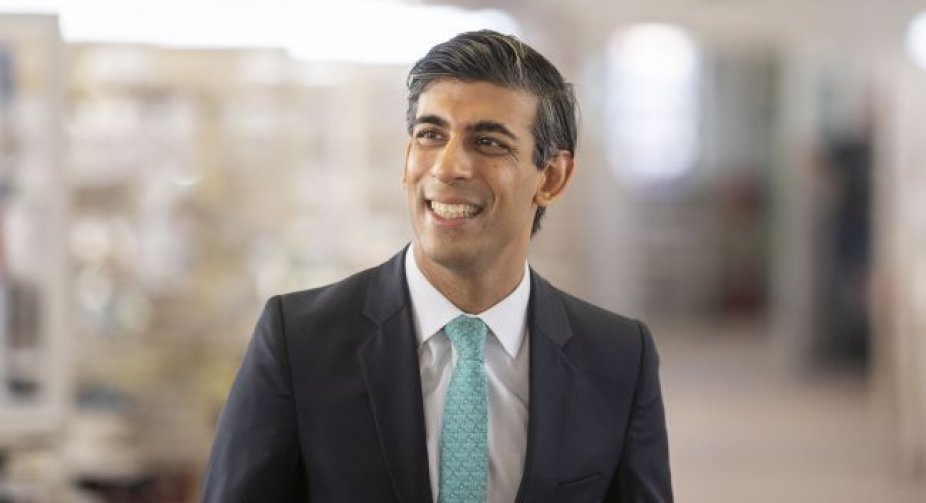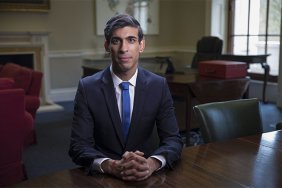Today, October 25, 2022, Rishi Sunak became the new Prime Minister of Great Britain. At 42, he is not only the youngest in 200 years, but also the first head of government of Indian origin.
RBC-Ukraine provides facts about the new Prime Minister of Great Britain.
Rishi Sunak officially became the Prime Minister of Britain after an audience with King Charles III at Buckingham Palace. He will be asked to form a new government.
Facts from biography
The leader of the conservatives was born in 1980 in Southampton in the family of doctors Yashvir and Usha Sunak, who migrated from East Africa. Their parents moved there from the Indian Punjab back in colonial times.
Rishi Sunak is a graduate of Oxford University, where he studied politics, economics and philosophy. In 2001-2004, he worked at one of the world's largest investment banks, Goldman Sachs, then received a master's degree in business administration at Stanford University.
After that, he worked at the hedge fund TCI, founded a global investment company with a turnover of 1 billion dollars, which specialized in supporting British small businesses.
While studying at Stanford, he met his future wife, Akshata Murthy, the daughter of an Indian billionaire who founded the software development company Infosys. The combined fortune of the married couple is estimated at 730 million pounds sterling (almost 830 million dollars), they are in the third hundred richest people in Great Britain.
Political career
Rishi Sunak entered the British Parliament in 2015 after winning the Richmond (York) constituency. Two years later, he was re-elected, confidently beating the candidate from the Labor Party.
He was first involved in government work in 2018 during Theresa May's personnel reshuffle, as a result of which he received the position of Parliamentary Assistant to the Minister for Housing, Communities and Local Government.
In July 2019, he became the chief secretary of the Treasury in Boris Johnson's government. In the winter of the same year, he won the third consecutive victory in his district with a result of 63.6%. Already in February 2020, he was appointed Chancellor of the Treasury (Minister of Finance). During the COVID pandemic, it provided business financial assistance measures, which made it popular among the British.
Sunak held a strong position in Johnson's second government. It was his resignation in July 2022 that started the process, as a result of which the prime minister was forced to resign.
"The public rightly expects that the government will work properly, competently and seriously. I understand that this may be my last ministerial work, but I believe that these standards are worth fighting for, and that is why I am resigning," said the then minister, expressing dissatisfaction with the work of Boris Johnson.
The struggle for leadership in the Conservative Party
During the election campaign in the summer of 2022, Sunak was one of the main favorites for the position of leader of the Conservative Party and the prime minister's chair. According to the results of the last round of voting, parliamentarians together with Liz Truss entered the final stage, where ordinary members of the party already voted.
At the beginning of September, it became known that Truss was elected as the new leader of the Conservative Party, who received 81,326 votes against Sunak's 60,399.
However, "Thatcher's friend" lasted only five weeks and resigned under a barrage of criticism for the failure of economic and financial policies.
This time, the British conservatives decided to conduct the procedure in a new way. Candidates had to secure the support of at least 100 members of parliament. Rishi Sunak was once again seen as the favorite and according to polls, he was the most suitable candidate.
He officially announced his nomination only the day before yesterday, October 23. On the same day, former Prime Minister Boris Johnson, who was expected to force the fight, decided to step aside.
But later it became known that Sunaka has the support of more than half of the members of parliament from the Conservative Party. Against this background, his only rival, the leader of the House of Commons, Penny Mordont, made a statement about the actual withdrawal of the candidacy.
"We have elected our next prime minister. This decision is historic and once again demonstrates the diversity and talent of our party. Rishi has my full support," she said in a statement yesterday.
Thus, Sunak remained the only contender for the head of the Conservative Party.
Sunak's position in Ukraine
As the Minister of Finance, Rishi Sunak participated in the development of measures for financial support of Ukraine. He called the full-scale Russian invasion "barbaric and illegal." And he also warned that the war will have devastating consequences not only for Ukraine, but will also cause disruptions in the world economy.
After his resignation, he also made it clear that he supported Britain's financial obligations to Ukraine.
"If I become prime minister, I will redouble our efforts and strengthen our policy of full support for Ukraine, which was so skillfully pursued by Boris Johnson... President Zelenskiy, brave citizens of Ukraine, do not doubt: whatever happens here in the coming weeks, the United The kingdom will remain your strongest ally," he said during the election race with Liz Truss.
He also promised to prioritize funding for Britain's armed forces and maintain current levels of defense spending. This approach, accordingly, gives reason to believe that London's current course of supporting Ukraine with finances and arms supplies will at least be preserved.
In addition, on Ukraine's Independence Day, the English-language newspaper Kyiv Post published his letter to Ukrainians with assurances that Britain will remain the most consistent and strongest ally.
It is noteworthy that in the summer Sunak said that the prime minister's first foreign visit would be to Kyiv. Now he had an opportunity to confirm both his words and his position regarding Ukraine.
Why did Liz Truss leave?
Liz Truss was the last head of the British government approved by Queen Elizabeth II. Moreover, she appointed her fifteenth prime minister only two days before her death. Accordingly, Sunak was already approved by King Charles III in his new position.
As for Truss, she announced her resignation 44 days after her appointment. She admitted that she was unable to cope with the assigned duties. The reason was the downgrade of the rating due to its economic policy.
In particular, she proposed to lower income tax rates, as well as cancel the planned increase in corporate taxes. The difference had to be compensated by external borrowings. Against this background, the British pound collapsed to an all-time low, and mortgage rates in the UK rose. As a result, the prime minister's term of Liz Truss became a record short in the country's history.

